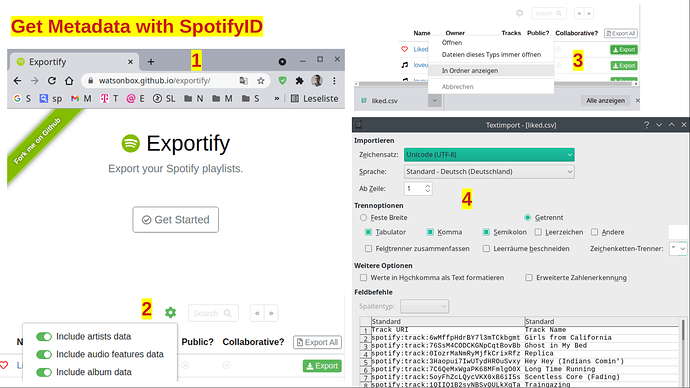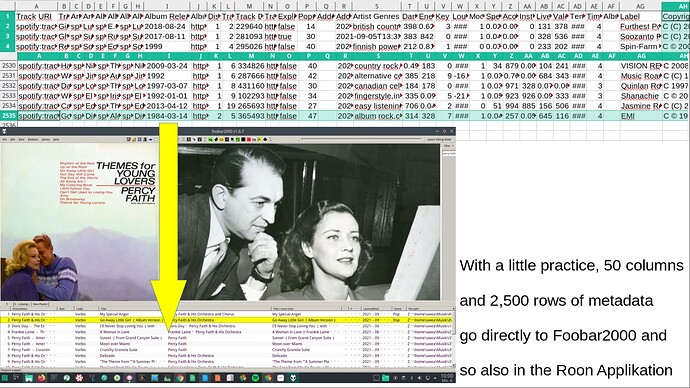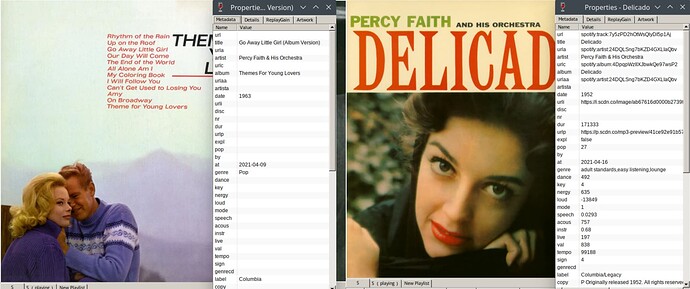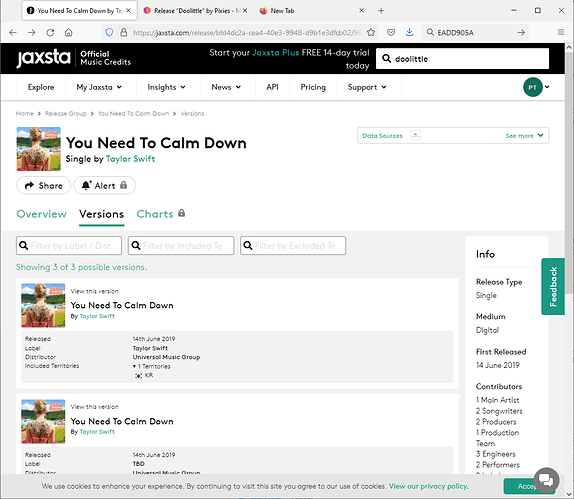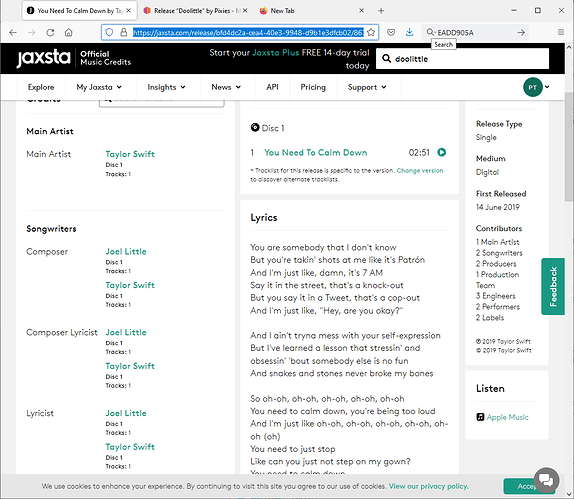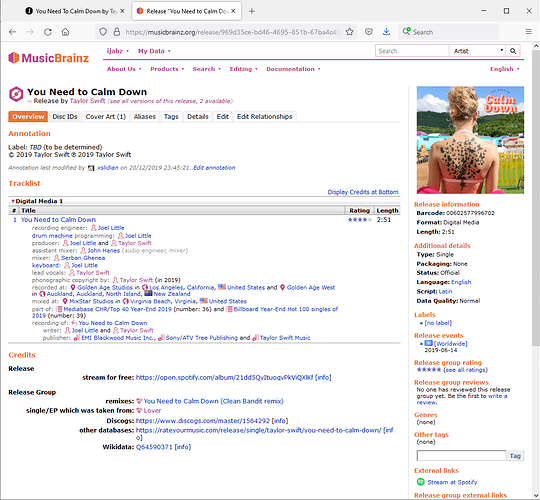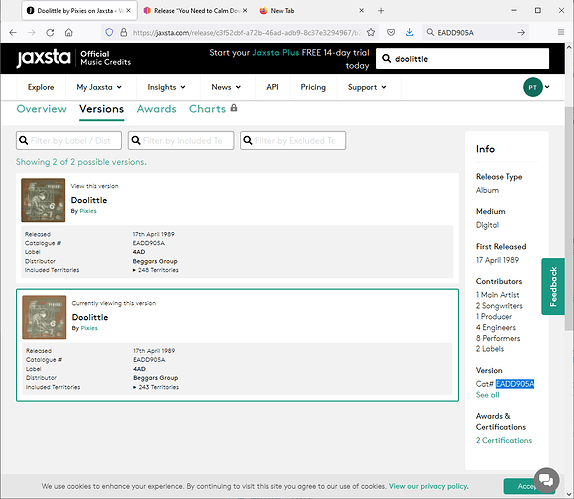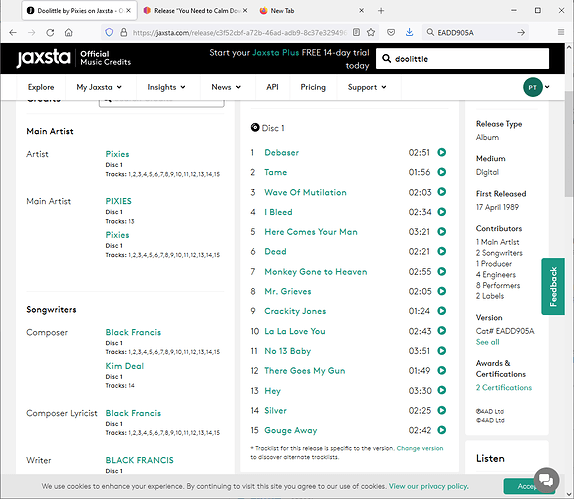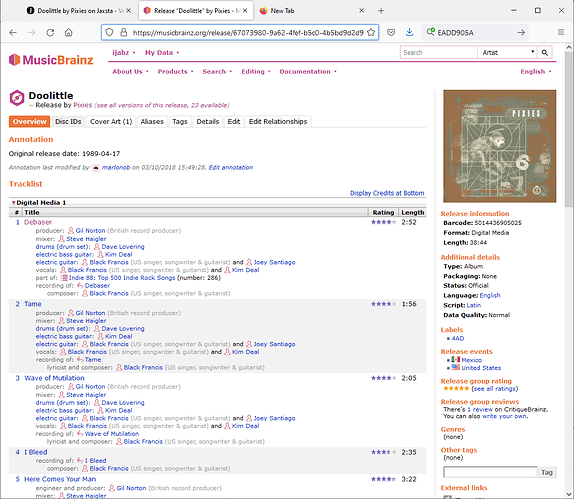Would be great to be included in the test program!
I’d love a metadata program that grabs lyrics and includes them in my tracks. I would also love someone to grab the liner notes/ booklet scans from archive.org and include them in the folders of my albums. I miss my liner notes
I’d pay gladly for these two features.
Sheldon
Agreed, better to have it all in a single record.
I’d strongly prefer that saving the highest resolution artwork be automated - ideally I’d just want to supply a naming convention and the rest is taken care of when one confirms the correct release…
Quick question:
I infer you’re intending to save the metadata to a CSV or a SQLite database? How do you envisage a user getting it into the underlying file metadata?
My teacher in flexible tagging was Frank Bicking. I don’t know if he is still alive. His forum AudioHQ is still on the net. An old pearl and was still being accessed and praised in 2019.
https://www.audiohq.de/viewtopic.php?id=775
https://www.foobar2000.org/components/author/Frank+Bicking
He also opened the way for me to this audio forum:
https://hydrogenaud.io/index.php?board=28.0
What I learned there, I’m happy to share.
Foobar2000, like MP3Tag, is a powerful tool for tagging. It takes more training, but it’s worth it for many years of comprehensive maintenance inside or outside of music files.
Outside, like Roon, always has the disadvantage that the maintenance is only visible in the program where it was maintained. This is very reasonable for data from Tidal or Qobuz, but my own data should contain everything I can find on the net, independent of the program.
I found a lot of metadata in tabular form e.g. here.
https://watsonbox.github.io/exportify/
They are actually used to archive (backup) the Spotify library and playlists. What else you can do with it, I want to visualize.
In 4 steps the table data are on the harddisk (here 34 columns and 2535 rows).
With some setup steps you can copy & paste to Foobar2000. The number of columns and rows is not limited. I have already copied 300.000 rows of only one column. It is also possible to create more fields. 34 columns and 2525 rows of Exportify must have only the same order in the field sequence.
If everything was done well, you have infinitely more metadata in your collection and can even copy & paste the same playlists with the provider ID at (Spotify, Tital…). So you become more independent when later all play HiFi.
This way works for Windows, Linux und Mac
Hi, great goal to improve the metadata for others but I would argue this is not the way to do it.
I wasn’t sure if this one of your reliable sources or just a temporary solution because do you realize that Spotify gets much of its data from MusicBrainz. It’s not listed as a supporter because not all companies like to publicize they use MusicBrainz (roon isn’t here either) - Supporters - MetaBrainz Foundation but as I have worked closely with MusicBrainz in the past I know for a fact that Spotify do support and use MusicBrainz
Also if you notice on the webpage under Universal Music it says
Universal Music uses the MusicBrainz data to enhance the effectiveness of their own metadata
Because actually the record companies do not necessarily have very good systems for managing their metadata, and they are very much focussed on the current releases rather than ensuring accuracy in older releases, so when you say
I would have to disagree, do you have any evidence to back this up ?
Personally I have found the MusicBrainz to be very accurate, it is certainly incomplete, many releases are not in the database, and the level information about a particular release can vary but I rarely come across actual errors. There are some ways they organize Classical releases that i consider to be an error, but if you accept this is the way they do it then the actual metadata they record I find is correct.
Jaxsta have a nice glossy website but think really their aim is to help music artists connect with their audiences, not to provide a comprehensive database of an artists discography, it doesn’t seem a particularly good fit as a place to find accurate metadata to me.
Personally would consider it time better spent to simply add those missing releases to MusicBrainz, or provide greasemonkey scripts to make it easy to add data to MusicBrainz, submit the songs to Acoustid so they can be identified by fingerprinting and matched to MusicBrainz, or lobby MusicBrainz to provide a proper api for adding data.
Certainly commercial companies are looking for your closed world in addition to open source.
Spotify bought EchoNest for over 100 million and they had developed Echoprint.
other technology is not necessarily needed, as the leading technology 
Later, Niland and further purchases were added.
Competitions were the last thing to go. What all there was can be read here:
https://musicbrainz.org/doc/Fingerprinting
AcoustID is already the third and newest audio fingerprinting system from MusicBrainz. It was created by Lukáš Lalinský and published more than 10 years ago.
The world keeps turning and the sense of recognition has changed towards artificial intelligence and recommendation systems. Audio fingerprinting is only a small component. No customer should have to identify anything anymore and if they do, Google, Shazam, SoundHound help. Sometimes the new generation gets new names and the next generation works with Midomi.
The digital market set-up probably took place against rather than with these companies. Lawyers have different know-how than experts in this industry. They simply wanted to prevent many things that are taken for granted today and generate billions in sales. Why should the best database be maintained exactly there? They don’t really want your artists to participate in the new billion-dollar business in a much better and more transparent way. Here again other or small well-connected circles of the industry with side businesses perform. MusicBrainz is not invited by the lobby. Discogs is in a better position, because here only write-offs are made. Of course, mistakes remain everywhere, even at MusicBrainz.
All open and sometimes later paid projects have lived from the fact that many buyers of LP and CD have entered their metadata. This is how CDDB (later Gracenote) became big and then FreeDB, LastFM, AllMusic, Discogs etc. came into being. Some people are doing business with this data today.
Hi Uwe, I know all this background, what I don’t understand is what point you are trying to make here.
MusicBrainz (acoustic fingerprints) are a nice thing when virtually nothing is known, but should be reliably recognized. The reference to Spotify and Roon does not help, since none of the major streaming services really rely on these fingerprints. Strategically, the project is somewhat deadlocked by streaming.
This is more about identified music and additional metadata that already exists on the web. MusicBrainz can benefit from more work, but here is a new project that just collects what is already on the net and has never been used by MusicBrainz in this way for reasons I understand.
The reference to further sources reads like this with edit status January 12, 2021 at 11:45 am:
https://wiki.musicbrainz.org/External_Resources
The APIs of the streaming services are not on your radar!
So I’m afraid this side of music consumption and machine API is philosophically judged inferior there.
Where is Soundcloud & Co and what are the answers?
Things like Midomi or Shazam are all very well for identifying a few songs but not for identifying and improving the metadata of a whole collection. Musicbrainz have no problem with Soundcloud, they dont allow fully automatic import of any metadata.
@Sheldon_Stokes Hey Sheldon! both are great ideas. I could easily add lyrics, but the issues is where to get them from. Of the free APIs, genius seems to be the most complete but accuracy cannot be guaranteed. Options like LyricFind are paid services that supply lyrics to services like Deezer for example. But I am looking into it. Regarding archive.org , I think it is a cool idea but is not of much use for digital releases, which is what my app focuses on. To make sure I was matching the correct liner notes with the correct album, I would need to use the album’s UPC, or catalog number, or other identifiers that exist for physical copies but not for digital music. But I will of course look into this once things get settled and I have some time  I also miss liner notes
I also miss liner notes
@evand I can probably make a settings menu where you give a directory for cover art to download and maybe a naming convention. You would still have to push a button to download it though, or else you would download it every time you searched for that album or its tracks. But I hear ya.
a .csv file can be opened in anything like Excel. a lot of programs will be able to open a .csv file including some tagging apps which can ready a .csv and then apply it to your music files.
Ya, dealing with a CSV is not a problem as long as the layout is understood. I wasn’t aware of any taggers that ingest CSV - I’m mostly Picard and puddletag, and more often than not metaflac for bulk operations.
hey @paultaylor ,
I appreciate your input and knowledge but I do not agree with you on some of them. As the starting off point I use Spotify and Apple Music API. These get all of the basic metadata like UPC, ISRC, Labels, Publishers, Copyrights and so on. This is the information that MusicBrainz lacks most of the time, or it is wrong and taken from a hardcopy which is not the same.
From what I have researched, this is absolutely not true. In 2018 Spotify started a program to get its information from the labels/publishers and the artists themselves. This had to do with making sure that artists and contributors got paid what they deserved. There are a lot of articles on it if you do a search. I will try to find on later if I have time. Plus, many users use Spotify and Apple Music to populate MusicBrainz. Since Spotify and Apple Music have the information first for new releases, they can’t be getting it from MusicBrainz. They may get some information from MusicBrainz like relationship info or something, but it is certainly not their main source of data.
that link bring me to the homepage so I can’t find that, but I believe it is there. The wording there does not suggest they get their information from MusicBrainz, but I helps to “enhance the effectiveness” of their data, whatever that means.
for older releases I agree with you. But as I have mentioned before my goal is not to provide crowd sourced data for older releases. It is to provide the correct metadata that if often missing from digital albums when purchased, or downloaded.
Do you have any evidence that disproves this? We are talking about two different things here.
I do not think that is their aim at all. I have been talking with them for a couple of months now but I can’t say anything more than that. Regardless, what difference does it make if their API and database provide accurate information?
Out of all of the new releases that come out every week, I would barely make a dent. But if you think that is the best use of my time, then why don’t you do it as a use of your time?  Or why not make an app that does it for people to use? Plus, just me adding releases to MusicBrainz does not help other people access other sources of information. There already are tons of scripts and tools to help users add information to their database. Most of them utilize Spotify, Deezer and/or iTunes API. I feel my time is better spent on making something different, something that can be used alongside the currently available sources. But we will see what I can eventually come up with. Maybe it will be a waste of time, but maybe not. I hope for the latter
Or why not make an app that does it for people to use? Plus, just me adding releases to MusicBrainz does not help other people access other sources of information. There already are tons of scripts and tools to help users add information to their database. Most of them utilize Spotify, Deezer and/or iTunes API. I feel my time is better spent on making something different, something that can be used alongside the currently available sources. But we will see what I can eventually come up with. Maybe it will be a waste of time, but maybe not. I hope for the latter 
Okay I missed that, your original post didn’t make that clear to me
How many of you would be interested in a metadata look up app that only gets its data from the major online sources and their APIs. It would not use any user curated databases like MusicBrainz. I have started using APIs to get my metadata instead of MusicBrainz and other open databases. So instead of having someone else buy a digital album, enter some of the info (often incorrectly) to a database, and then get my data from that database, I just go straight to the source. So I have decided to build an app to lookup and retrieve album metadata. Since I will be doing the work anyways, I may as well give it out/sell it if enough people are interested. Thanks
You are right that it will take some time for new releases to get into the MusicBrainz database, but I would think for most people the majority of their collection is old releases so I’m not sure that an app just designed for identifying new releases would not solve many problems.
MusicBrainz does certainly support digital releases,but I think in the case of digital versions of existing hard copy releases there is less incentive to add them to the database unless they are materially difference such as track listing
So am I right in thinking it is not that the MusicBrainz data is wrong its just that the digital release is not in the database so you are matching to the wrong release (a hard copy).
Just personal preference but actually I prefer to have the original catalog nos and original publisher ectera, so I may have bought a digital version of an album released twenty years ago but I am more interested in details of the original release.
I’m not saying that Spotify only use MusicBrainz, simply that they use MusicBrainz to improve their results, I know this because have been at meetings with Spotify and MusicBrainz but this was a few years back so I dont know the current situation. But it would probably be more to do with historical back catalog then new releases.
Sorry that was just meant to be a quote, its from the MetaBrainz supporters page , and I remember a guy from Universal coming to MusicBrainz and wanting some help in organizing the Universal back catalog.If you look at their finances they get $360,000 a year from companies wanting to use their data, which isnt bad for an open source website.
FWIW I did create a website to make it easier to add Discogs release into MusicBrainz - http://www.albunack.net/ - full details here
FWIW, actually Jaikoz can do this if in right format. Usual procedure is load files, export metadata as spreadsheet, modify spreadsheet, import spreadsheet to modify tags in files, but you could incorporate some interaction with anoither spreadsheet. And SongKong always create a spreadsheet containing all metadata at the end of a FixSongs task.
Thanks for this work
I signed up for a free account and it definently has better coverage of new releases, but I don’t see the credits for releases already in MusicBrainz are any better, I looked at two at random, firstly fairly recent single by Taylor Swift
https://musicbrainz.org/release/969d35ce-bd46-4695-851b-67ba4c40c905
Wierdly the Jaxsta one has territory set to South Korea although seems to be global release, cant see any notable difference in the credits between the two. Jaxsta does have the advantage of showing Lyrics, but whether you will be able to extract them is another matter as they are provided by LyricsFind
Then old album Doolittle album by Pixies
Jaxsta (need login to work)
https://musicbrainz.org/release-group/1aa41b19-5a72-341b-bd91-4cf61d1dab6b
https://musicbrainz.org/release/67073980-9a62-4fef-b5c0-4b5bd9d2d9ed
Jaxsta only has two releases, but it does list catalogno EADD905A , MusicBrainz has many more and does include a digital release but no catalog no for that one. Jaxsta just has a single First Released field set to 17 April 1989, clearly when the original album was released. Personally that is the date I would want to use, but it is not the correct date if you want to know when the digital release was released.
So it seems to me it could be a useful additional source, depending on the term of use of api, but is not a better source just another source.
@paultaylor you are certainly entitled to your opinion, but it almost seems as if you have another agenda here. It’s like you are trying to discredit my app/project before it has even really begun. The world does not need another MusicBrainz app. Suggesting that I use a product that I have already used for years and found it does not meet my needs is probably the least helpful suggestions one could make.  It is obvious you are very well connected to MusicBrainz which is fine, but It also makes me wonder why you feel the need to come here and promote Musicbrainz by derailing my thread.
It is obvious you are very well connected to MusicBrainz which is fine, but It also makes me wonder why you feel the need to come here and promote Musicbrainz by derailing my thread.
I am not here to argue the performance of MusicBrainz and the whole Jaxsta thing has already been discussed, so I’m not going there again.
So it seems to me it could be a useful additional source, depending on the term of use of api, but is not a better source just another source.
This is your speculative opinion based on two albums. If MusicBrainz worked as well as you say it does, then why do I always have to search for the missing and incorrect information after using it? Why do others face the same issue?
This thread was started to get input from potential users, who also are not satisfied with MusicBrainz. I am not asking what my app should be or to discuss MusicBrainz. If you aren’t here to discuss my project, then please go somewhere else. You can promote MusicBrainz in plenty of other places instead.
Nobody is against your plan. There are simply some doubts about some of your statements and they are being discussed (after all this is a forum, right?).
As for me I was simply curious to know which “official” databases were compiled by the Majors with a level of detail comparable to the booklet (as well as being reliable and exact), but I don’t seem to see any from the examples posted.
So, sorry but Musicbrainz remains the most trusted (with the big disadvantage of having to manually fill in the credits but hey man! I don’t see better solutions at the moment).
Furthermore, I’m still convinced that there is little interest in the credits from the Majors.
Anyway, good luck with your project.
